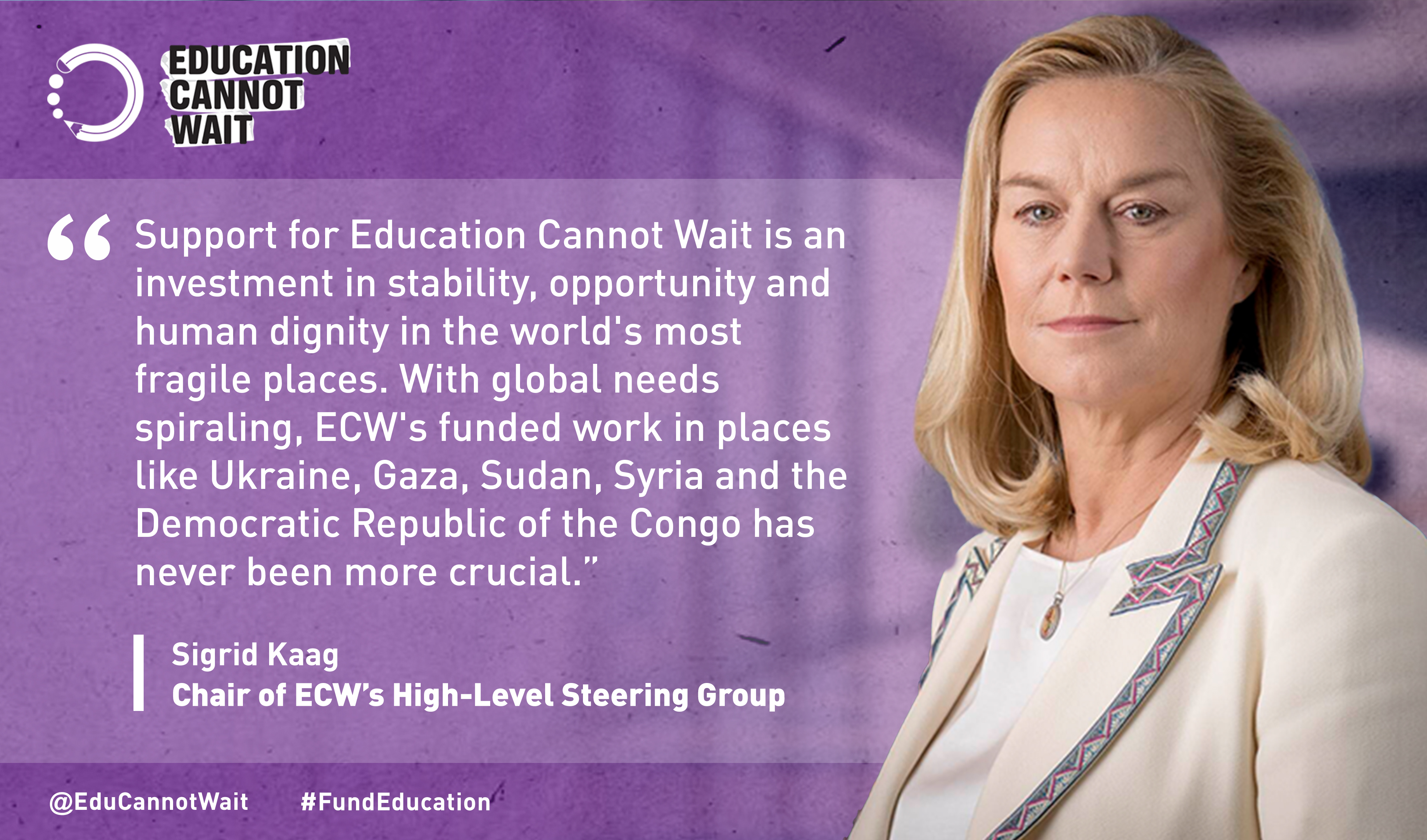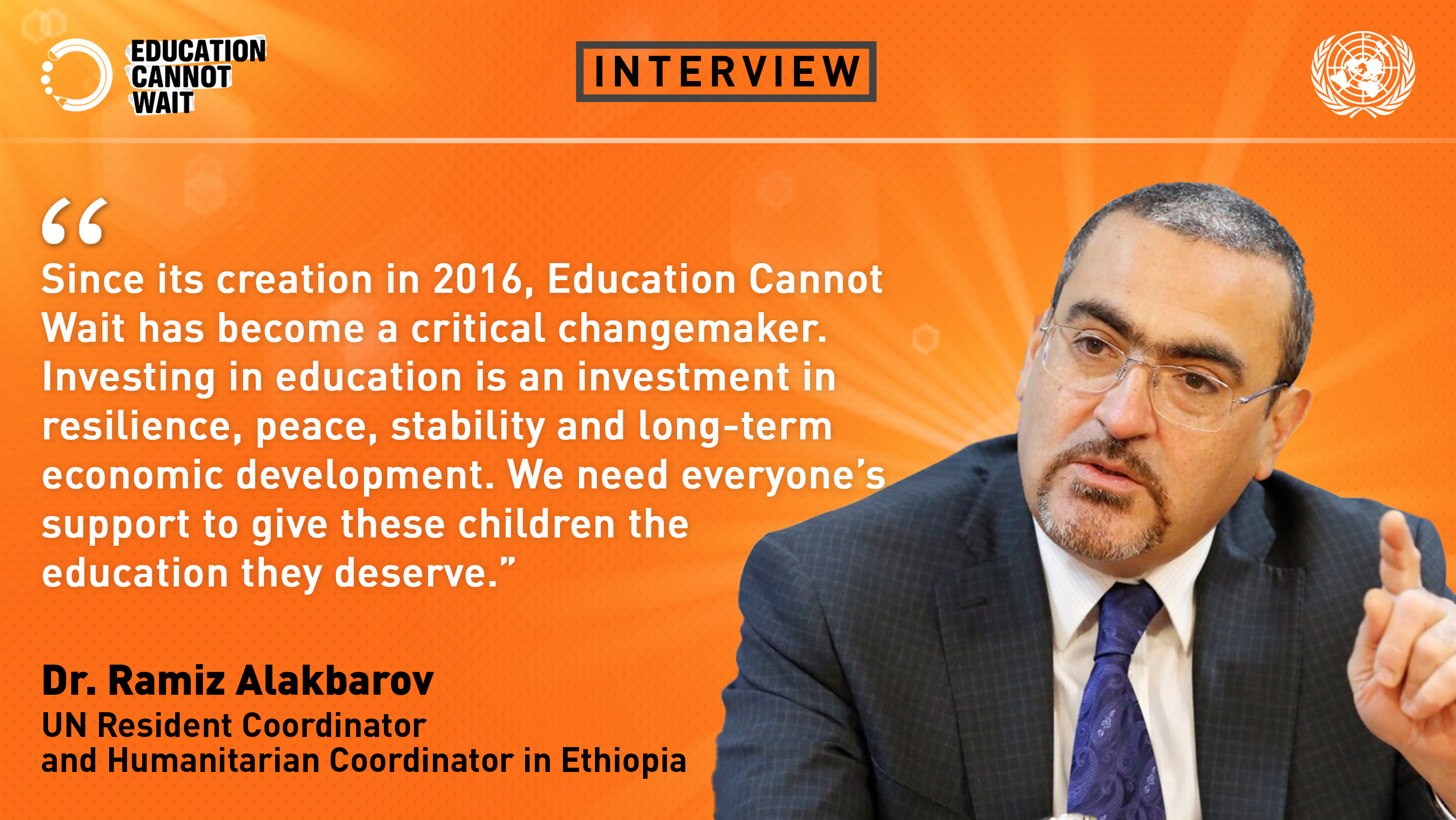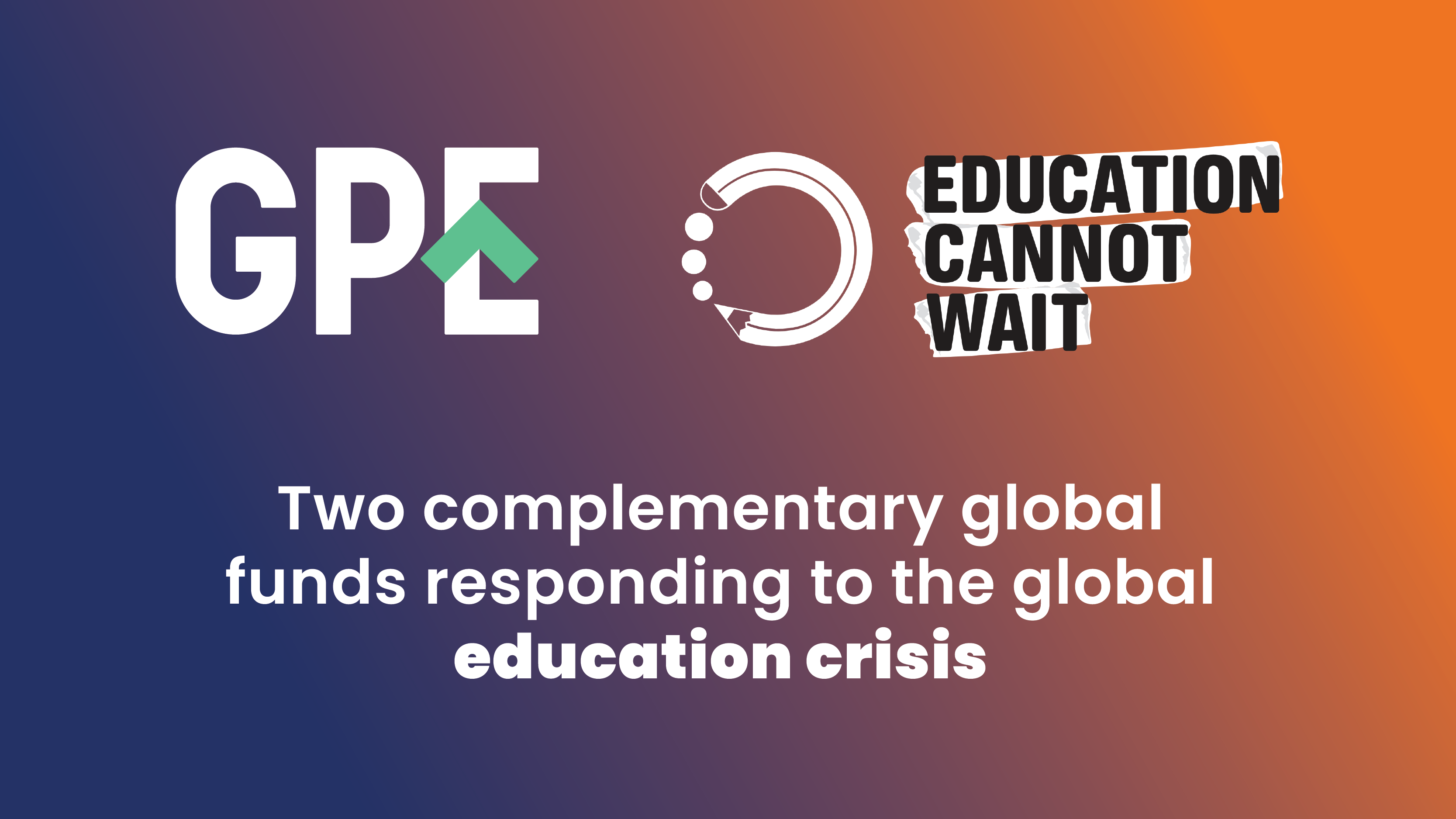Education Cannot Wait Interviews Leonardo Garnier, Special Adviser of the UN Secretary-General for the Transforming Education Summit
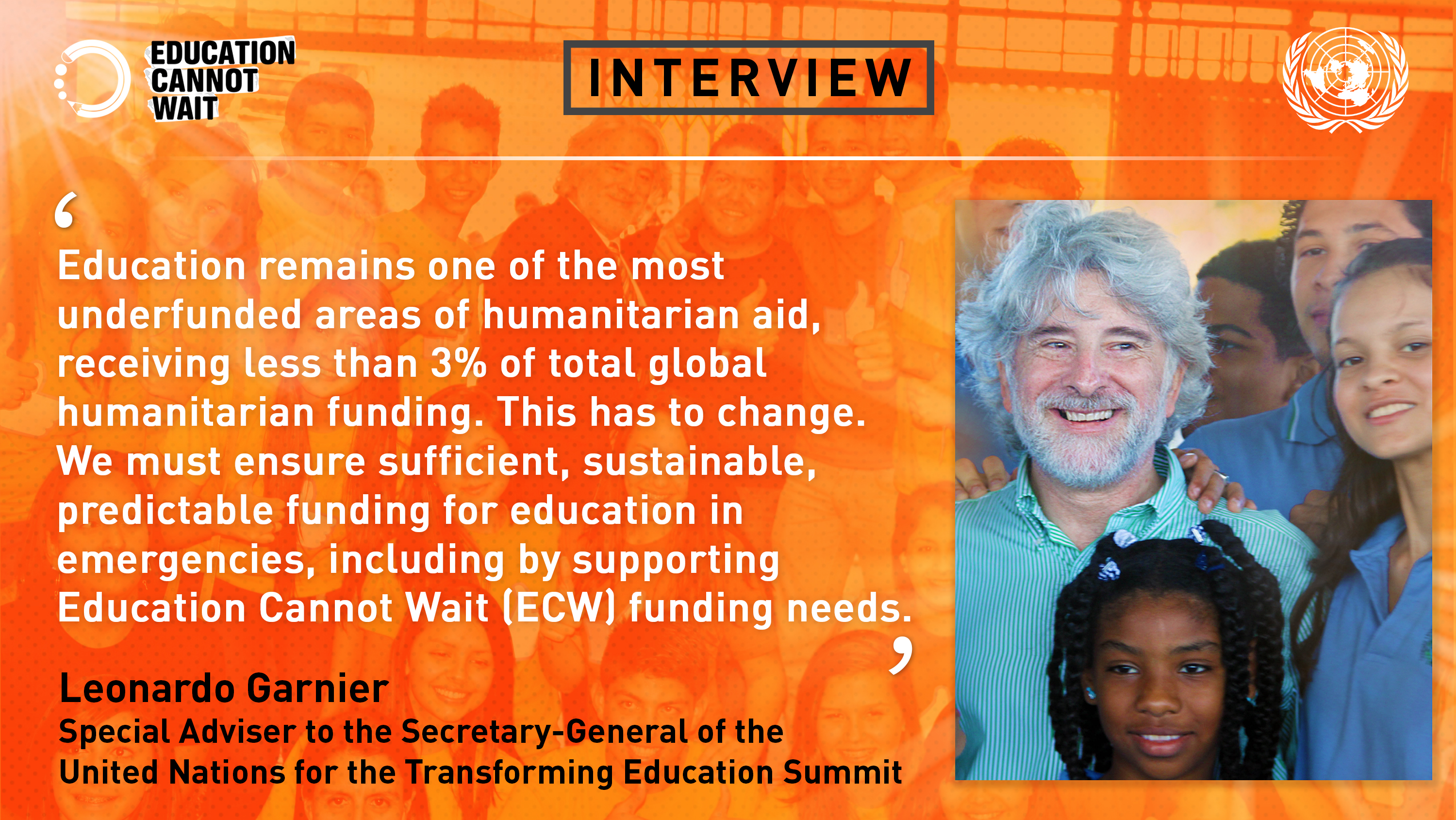
ECW: Congratulations on your appointment by United Nations Secretary-General António Guterres as the Special Adviser for the Transforming Education Summit. What do you hope to achieve through the Summit and why is it so critical that the world comes together to address the global education crisis around this September’s UN General Assembly?
Leonardo Garnier: In order to understand why it makes sense to convene the “Transforming Education Summit,” the first thing would be to recognize that, in terms of education, we are not doing enough, and we are not doing it well enough. Of course, there was some progress in the past decades, but it was insufficient and highly unequal. The simple truth is that, today, well into the 21st century, millions of children and young people are still not in school, and millions of those who are in school are not really learning, not really achieving the kind of learning that is relevant for their lives in the world they are living in. In most countries, we are lagging behind what was established as Sustainable Development Goal 4: “Ensure inclusive and equitable quality education and promote lifelong learning opportunities for all.” And this is ethically unacceptable, socially perverse, politically dangerous but, also, highly irrational and inefficient from an economic perspective. And yet, this is what is happening.
That is why the Summit is so important: it is not a technical, but a political summit. It is a moment of truth for heads of states and leaders of nations and global institutions, where we must commit ourselves not just to accelerate the pace, but actually to reimagine and transform education systems because only through such a radical transformation will we be able to really accomplish the goals of inclusive, quality education for all.
ECW: We seem to be falling behind in our global efforts to ensure inclusive and equitable quality education and promote lifelong learning opportunities for all (SDG4). What must political leaders, public and private sector donors, and other stakeholders do to align our efforts to achieve these goals and why is SDG4 so important in achieving the other goals outlined in the 2030 Agenda?
Leonardo Garnier: This is probably the most obvious and, at the same time, the most difficult question we are facing in education: we know that investing in education is the key, not just to eliminate poverty and reduce inequality but also as an essential part of promoting more peaceful and sustainable development. We also know that investing in education is critical for accelerating economic growth and improving the future income of people and nations. In fact, we know that the rates of return of investing in education are higher than almost any other kind of investment. Then, how do we explain the fact that we insist in under-investing in education?
Aside from the obvious fact that some countries are currently too poor to invest what they would need to invest in education – I will refer to this problem in the next question – I think there are structural and political-economy realities that explain that even in middle-income countries we do not invest enough in education. In order to explain such an absurd situation, I would propose two simplified hypotheses.
One has to do with what we call low-level equilibria or poverty traps, which means that, in countries where low wages and low productivity prevail, education per se is not perceived as an investment, but merely as an expenditure that will not significantly improve national growth and businesses profitability. Thus, the idea of increasing taxes to finance education is rejected by the business community and by the middle class because it is perceived as a negative distortion instead of being understood as a key game changer. The second and related hypothesis has to do with the political economy of such low-level equilibria and the highly unequal character of less developed countries: the elite – whether we are thinking of the 1%, the 10% or the 30% with higher incomes, have their educational needs pretty much solved through expensive private education. Thus, increasing taxes and expenditures for expanding and improving education is quite unattractive for them: they see it as wasting money on other people’s children. And … they don´t really care.
This is why, even if we know that financing education through taxes and the national budget would be a fair and efficient way of promoting both a dynamic and sustainable style of development, it does not appear as attractive to elites in countries characterized by predominantly extractive or low productivity economies. Low wages attract simple, unsophisticated investments, with low productivity, and these investments do not require better educated or skilled workers. Education, as I said, is perceived as a waste.
Low level equilibria do not wither away easily: they must be broken, so that education is not just “perceived”, but actually works as an investment producing the type of better paid and more productive labor force that a dynamic economy needs. For such a transformation, the voice of the majority of the population, which is now denied access to high quality education, has to be heard loud and clear in the political debate. This is not just a technical or economic matter, it is a political matter.
There are examples in recent history of countries that managed to escape low level equilibria, to transform themselves from extractive- or low-productivity economies with a largely poor and uneducated population, into a vibrant and dynamic society capable of both increasing productivity and wages and improving the education of their population. Such is the path towards equitable and sustainable development and that is the path this summit must promote.
ECW: The Transforming Education Summit is an opportunity to rekindle international political and financial commitment to education as a pre-eminent public good. You have an academic and professional background in both economics and education. Why is financing for education – including for global funds like Education Cannot Wait, the UN global fund for education in emergencies – a priority?
Leonardo Garnier: As I said, the reason many countries are not investing enough in education is complex. It is not just because of ignorance, because they “don’t know” how high the return to investing in education can be, but because their economy is based on the rents they extract from access to very cheap labor and natural resources. So, they don’t have the right incentives to either increase the productivity or guarantee the sustainability of such resources. Insofar as the political system reproduces the logic of an extractive economy, poverty and inequality will remain the inevitable result.
But even when a country manages to change the political balance in order to break free from such poverty trap, it is possible that the kind of investments required for such transformation – like investing in high quality education for all – are beyond their reach. For many poor countries, the relative weight of such effort, when compared to their national income or to their public budget, might be just impossible to sustain.
For this reason, in many low- and lower-middle income countries, national efforts would not be enough to adequately finance their educational investment and they will require the significant support of the international community. Unfortunately, the resources and financial instruments that have been available so far for this purpose, are amazingly small and difficult to access. Thus, in the same way we say we need to transform education, we also need to transform these financial instruments so that the amount, or resources necessary, to finance education across the world – and especially for those who need it the most – are really available and accessible.
Some quite innovative proposals are on the table, and I have no doubt that the Transforming Education Summit will be the right place to discuss them and bring them to life.
ECW: When you served as Minister of Education in Costa Rica, you were able to significantly improve the national enrolment rate, especially for marginalized rural and indigenous communities. Are there lessons that can be adapted and applied to help improve enrolment for children impacted by armed conflicts, displacement and other humanitarian crises?
Leonardo Garnier: The first lesson for any successful reform of education, especially when your purpose is to reach those that have traditionally been excluded from the educational system, is to understand the context and the specific reasons for such exclusion. In the case of Costa Rica, the debt-crisis of the 1980s had a dramatic impact on high school enrolment, which went down to a mere 50% and remained under 60% during the last two decades of the 20th century. Reasons for low enrolment had to do with at least three different dynamics.
One, which we can actually call exclusion, had to do with poverty and the fact that, for poor families, even a free high school education can be too expensive, not just because of indirect costs (books, uniforms and so on) but also because of the opportunity cost of the income that young kids could generate when they work instead of studying.
This type of exclusion had to be confronted through social programs that compensate such costs: wide access to school meals, free transportation and – this was very important – a program of conditional cash transfers for poor students, so they wouldn’t need to work to bring some income home. We also made large educational investment in rural areas and Indigenous communities, which were the ones suffering from the highest exclusion from the educational system. This combination of policies had a clear impact in terms of exclusion: urban/rural educational gaps, income-related educational gaps, and also the gap between students from low and high education background were all significantly reduced.
A second problem we identified could be called “expulsion”, and it was the result of academic failure leading to the need to repeat the academic year, which in turn led to a large over-age student population which easily tended to drop out of high school. This had to be confronted both through improvements in the quality of education, curricular reform, and through reforms in the evaluation system and the elimination of the policy that said that a student would have to repeat the whole year even if he or she failed in only one subject.
Finally, there was something I could very well call “repulsion,” which basically means that students drop out when they do not feel really engaged with what they learn at school, and with the whole experience of being a student. This, again, requires curricular innovations aimed at making learning interesting, useful, relevant and attractive for students living in today’s world. Confronting “repulsion” also had to do with a whole set of activities related with the school experience from a holistic perspective: the role of the arts played a key role; sports and games were also important; the participation in student organizations and student governments, and so on. All activities aimed at developing a sense of belonging in the educational community. With respect to Indigenous populations, this also required specific reforms aimed at respecting their culture and world view, and their right to have teachers from their own communities.
ECW: Armed conflicts, forced displacement, climate-induced disasters, COVID-19 and other protracted crises continue to push millions of children and adolescents out of safe, quality, inclusive learning environments. How can we transform the delivery of education in emergencies and build back better from these interconnected crises in places like Afghanistan, Ukraine, the Sahel and beyond? Also, as the UN’s global fund for education in emergencies and protracted crises, Education Cannot Wait and our strategic partners are embracing UN Reform, the Grand Bargain Agreement and Our Common Agenda. How can this reform agenda deliver on the UN promise to “save succeeding generations from the scourge of war, and reaffirm human rights,” as outlined in the United Nations Charter?
Leonardo Garnier: As I said above, inequality has been ingrained in educational systems all over the world, thus reproducing and even widening the already large inequalities that characterize most countries in our planet. Most disadvantaged and vulnerable children, precisely those who would need the earliest and strongest support from public education, tend to be the ones who end up either excluded or receiving the weakest educational services.
But if this is true about what we could call structural inequality, it becomes even more dramatic when we are talking about those children and young persons whose educational opportunities are cut short as a result of particular emergencies arising from situations of conflict, climate change disasters, public health emergencies, or by their forced displacement within and across borders.
Displaced children, especially if they are perceived in some sense as “different” – whether for ethnic, cultural, religious, nationality or other reasons – often face not only educational exclusion, but also various forms of discrimination and aggression (bullying). What should be a mere accidental difference and a situation of vulnerability becomes a source of inequality and even violence. As usual, this tends to affect girls and women in a disproportionate way.
Schools, as educational spaces, should aim exactly for inclusion, not exclusion. Schools should always work as a haven for children facing such dire circumstances; not only as the place where they can continue to learn and develop their capabilities and to reach their potential, but also as safe, inclusive and caring places that makes them feel protected and welcome. Schools – and countries – should promote protection and inclusion in national education systems for refugees, asylum seekers, stateless and any kind of internally displaced children or young persons.
When we talk about “transforming education”, this should be a central piece in the transformation: schools and education systems should make sure that any boy, girl or young person confronting exclusion because of some kind of emergency will be immediately included and cared for and have equal opportunities to fulfil their right to education in emergency contexts. This should be particularly true for girls, young women, for gender diverse persons and for learners with disabilities who tend to face strongest discrimination. This includes not just their access to schools and to learning, but also the necessary emotional and psychological support required.
And yes, this can be expensive, but it is of the essence of human rights. Especially in large emergencies, this would demand significant additional resources to have not only the physical capacity to incorporate new students, but also the availability of adequately trained teachers for emergency contexts.
While highly developed countries might be in a better position to handle such extraordinary needs in times of emergency, it is not always so. And the situation is much more stressful and difficult for less developed countries, who will most certainly need international cooperation to handle the educational demand during unexpected crises. And yet, as has been repeatedly noted, the truth is that education remains one of the most underfunded areas of humanitarian aid, receiving less than 3% of total global humanitarian funding. This has to change. We must ensure sufficient, sustainable, and predictable funding for education in emergencies, including by supporting Education Cannot Wait’s funding need.
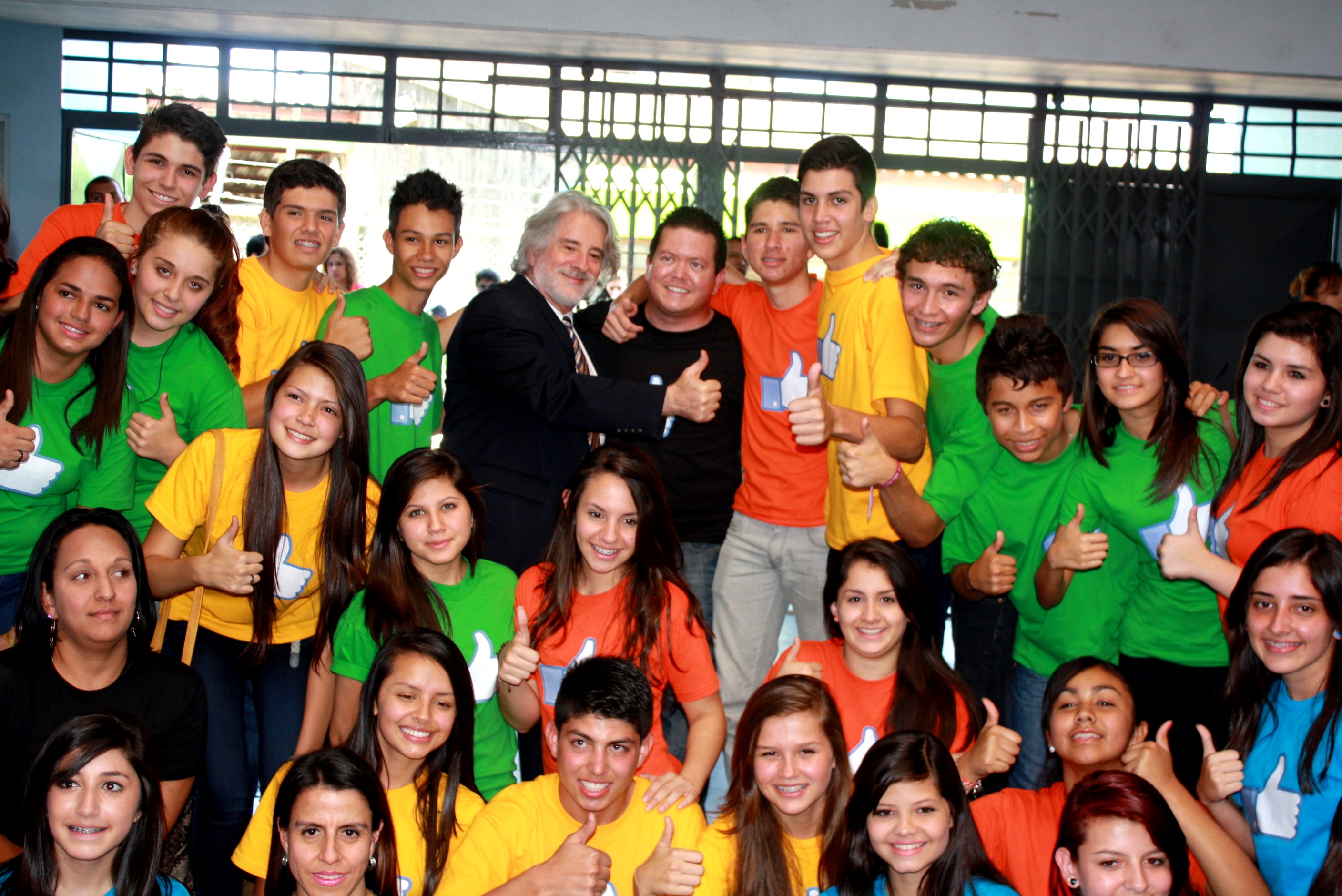
ECW: Reading is a key component of education, and we believe that readers (and writers!) are leaders. You’ve written some wonderful children’s books and as well as academic works on society and economics. Could you share the titles of one or two books that have influenced you the most in your life, and why would you recommend them to others to read?
Leonardo Garnier: Reading is many things: reading is useful, as it gives access to other people’s knowledge, which we might need to confront or solve specific problems or to further our own knowledge. Reading is humanly enriching as it lets us experience other people’s lives and tribulations, their feelings and their anguish, as well as their dreams and hopes. Reading puts us in contact with people from other cultures, other times, other places – or with people very much like ourselves. Reading is eye opening – or should I say mind-opening; and reading makes us re-think and re-evaluate our own perspectives, by confronting them with other, different perspectives. Plus, reading is fun and a pleasure, it is a joy. In all these senses, reading is a peculiarly human experience.
There are so many books that I have enjoyed through my life, and that have played an important role for me, that picking two is almost impossible and inevitably unfair.
Many academic books affected my understanding of human society and its complex and unequal development. Among them, I would signal one author – Albert O. Hirschman – because of his immense ability to combine social, economic and political theory with a very peculiar common sense. Of his many books, I would mention “The Strategy of Economic Growth”, “The Passions and the Interests”, and “Exit, Voice and Loyalty” as those which most influenced my own way of thinking about social, economic and political development. But there are so many others…!
And in the field of literature the task is even more difficult, so, again, I will mention three books. I always think of two of them as going very well together: Aldous Huxley’s “Brave New World” and George Orwell’s “1984”: two books written many years ago and which prefigure many of the things we see today in this strange world we’re living in. (We could probably now add Margaret Atwood’s “A Handmaid’s Tale” and have a trilogy). And then, there is the magnificent “Memoirs of Hadrian” by Marguerite Yourcenar. In her notes about this book, she quotes Flaubert as saying: “When the gods no longer existed and Christ had not yet appeared, there was a unique moment, from Cicero to Marcus Aurelius, when man was alone”. And that is what she was looking for in Hadrian; again, in her words: “A large part of my life would be spent trying to define, and then portraying this man: alone, and, at the same time, linked with everything.” As we all are.
ECW: The Transforming Education Summit is a key moment in 2022 to help change the world for the better for children. Please feel free to add in any points here about the Summit which you’d like our readers to know about as the world mobilizes towards it.
Leonardo Garnier: As the great Brazilian educator, Paulo Freire, once said, we have to understand education as the responsible praxis of freedom. Every boy, every girl, every young person must be able to fulfil his or her full personal potential and to become the person he or she wants to be. Everyone should have access to the best education for achieving his or her goals and to actively participate in the construction of their own communities, of their own country and, of course, on the collective construction of the world we want to live in. That is what education is all about: learning to live together in peace in this fragile world.
My personal frustration is that saying this is nothing new. We’ve said it so many times it sounds like a platitude: all kids should be in school; all students should have access to a high-quality education. And yet, as I said at the beginning, the truth is that millions of kids remain out of school, and millions of students are not learning properly what is relevant for them. We always seem to find an excuse: there is not enough time; there is not enough money; resources are scarce; there are many other priorities; and so on.
Priorities, yes. Let’s look around. Let’s ask ourselves the simplest of questions: while millions of kids are denied their right to a good education, is it true that we are devoting every cent we have, every resource we have, to produce – and to consume – something that is more important that these kids’ education? Is this really about priorities? Or is it that really, we just don’t care enough?
I wonder if arguments or excuses for not assigning the necessary resources to fully achieve quality education for all would remain so if those who have the power to allocate those resources were deciding on the education of their own kids, and not just on the education of “other people’s kids.” If we really believe quality education should be for all – really for all – then we should also understand that every kid is our kid. And yes, they should be held accountable if they don’t do so.
This summit should tell not just whether we understand the importance of education for all; but whether we really care.
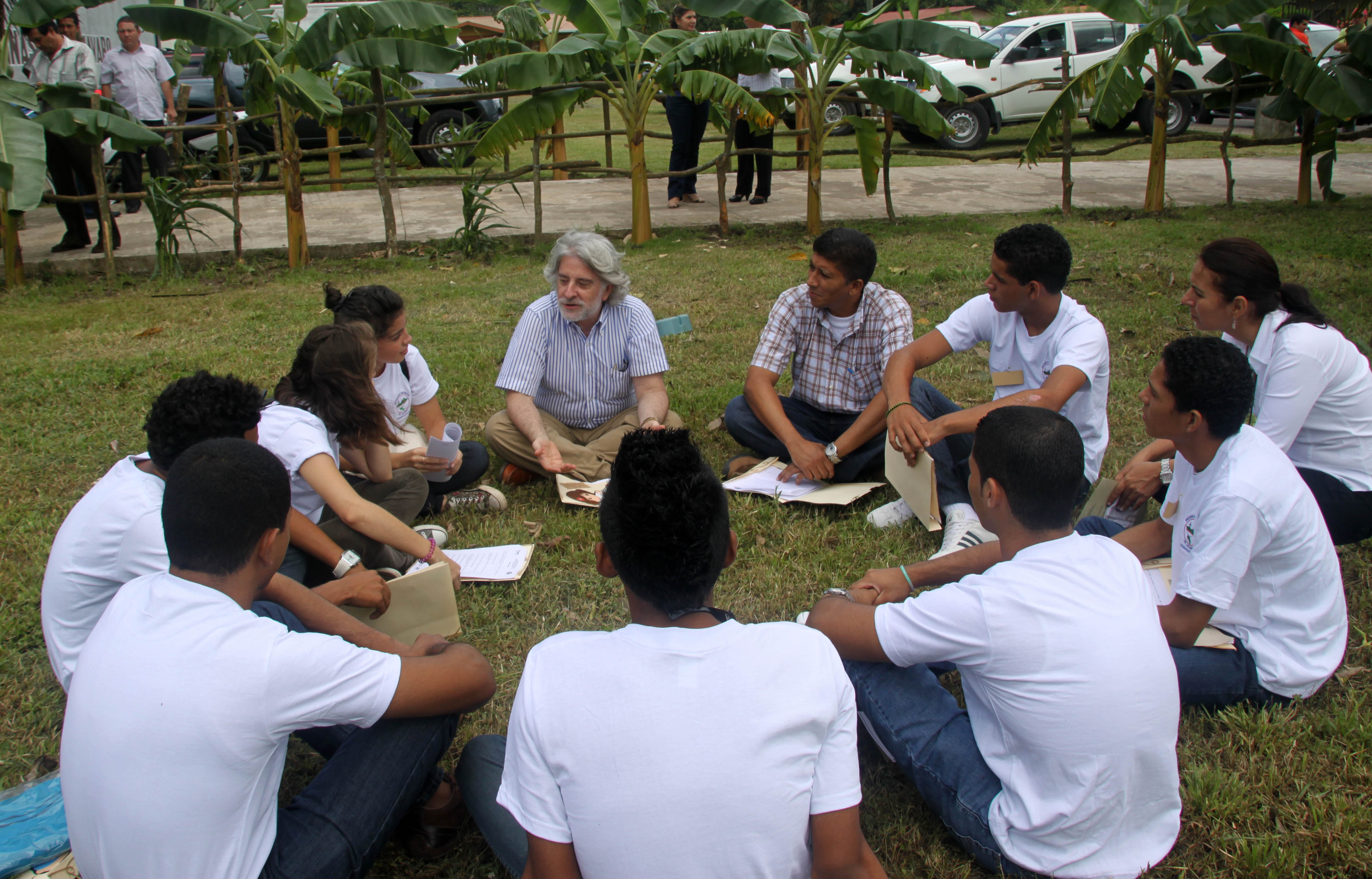
About Leonardo Garnier
Leonardo Garnier is the Special Adviser to the Secretary-General of the United Nations for the Transforming Education Summit. A Costa Rican national, he is an economist who graduated with a Ph.D. from the New School for Social Research in New York. He also holds a B.A. from the University of Costa Rica, where he is a professor. Garnier was the Minister of Public Education in Costa Rica during two consecutive terms (2006-2014), as well as Minister of National Planning and Economic Policy (1994-1998).
As an academic, he has published articles in journals and books on economic and social issues linked to development, as well as the book “Costa Rica: un país subdesarrollado casi exitoso” (Costa Rica: an almost successful underdeveloped country), written with Laura Cristina Blanco. He is the author of three books of short stories: “Mono Congo y León Panzón“, “Gracias a Usted” and “El sastrecillo ¿valiente?”. Garnier is also the author of multiple opinion articles and actively participates as an opinion maker in digital media and social network.

